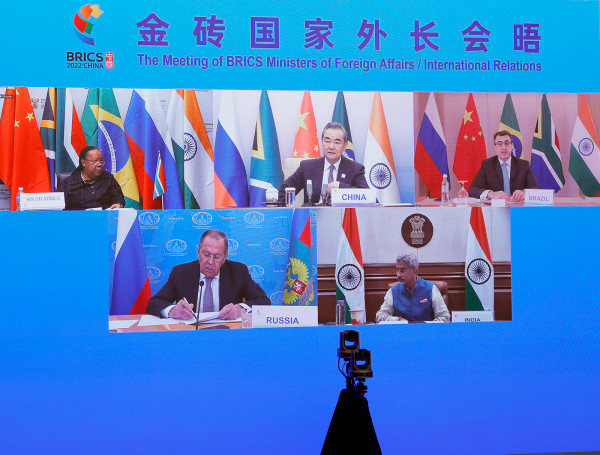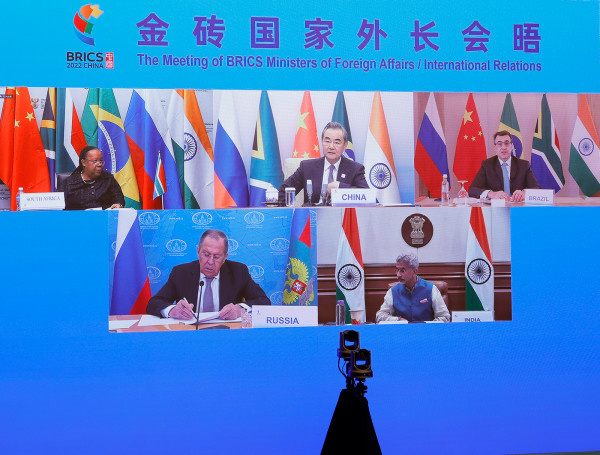By He Yin, People’s Daily

Photo taken on May 19 shows the Meeting of BRICS Ministers of Foreign Affairs/International Relations held in a virtual format.
Chinese President Xi Jinping delivered a video address at the opening session of the BRICS Foreign Ministers’ Meeting on May 19.
He profoundly expounded on security and development issues, and offered important opinions on deepening political and security cooperation among BRICS countries, enhancing confidence in and strength for building a community with a shared future for mankind.
He said, “As a positive, inspiring and constructive force in the international community, the BRICS countries need to firm up belief, brave the storms and waves, and take real action to promote peace and development, uphold fairness and justice, and advocate democracy and freedom, so as to inject stability and positive energy into international relations in a period of turbulence and transformation.”
The world today is seeing profound changes and a pandemic both unseen in a century. It is facing sluggish global recovery, a widening development gap, rising global challenges, as well as increasing factors of instability, uncertainty and insecurity in the international situation. At the same time, the governance, trust, development and peace deficits continue to grow.
Despite it, peace and development remain the unchanging theme of the times, the aspiration of people across countries for a better life remains unchanged, and the historical mission for the international community to pursue solidarity and win-win cooperation remains unchanged.
Facing the various risks and challenges of the day, it is more than ever important for emerging markets and developing countries to strengthen solidarity and cooperation.
“Both history and reality tell us that seeking one’s own security at the expense of others’ will only create new tensions and risks,” Xi said in the address.
In the world today where countries are interdependent, the pursuit of absolute and exclusive security has no way out. Countries must replace confrontation with dialogues, coercion with negotiation, alignment with partnerships, and zero-sum games with win-win cooperation, so as to maximize the convergence of universal security.
The Global Security Initiative proposed by Xi has contributed Chinese wisdom and schemes to tackling global governance challenges and narrowing the global security gap.
BRICS countries need to strengthen political mutual trust and security cooperation, maintain close communication and coordination on major international and regional issues, accommodate each other’s core interests and major concerns, respect each other’s sovereignty, security and development interests, oppose hegemonism and power politics, reject Cold War mentality and bloc confrontation, and work together to build a global community of security for all.
All emerging markets and developing countries need to develop. Facing risks and challenges, it’s more important than ever to strengthen the solidarity and cooperation between emerging markets and developing countries.
The Global Development Initiative (GDI) proposed by Xi has charted the course for promoting the development of the world. It has been supported by more than 100 countries and multiple international organizations, including the UN. Over 50 countries have joined the Group of Friends of the GDI.
BRICS cooperation is more than about the five countries. It bears the expectation from the emerging markets and developing countries, and the entire international community at large. BRICS countries need to communicate with more emerging markets and developing countries to build a more diverse network of partnership, and attract more attention from the international society on global development, so as to involve more emerging markets and developing countries in win-win cooperation.
A number of consensuses were reached at the first “BRICS Plus” Foreign Ministers’ Dialogue held on May 19, which demonstrated emerging markets and developing countries’ aspiration for and confidence in gaining strength through unity, deepening cooperation and jointly building a prosperous future.
China attaches high importance on the BRICS cooperation mechanism and is actively working to deepen the cooperation.
Since 2013, Xi has delivered a series of important speeches at the BRICS summit and on other important occasions, providing the cooperation with Chinese initiatives and injecting Chinese confidence and strength into it.
From pledging to flesh out the BRICS Partnership on New Industrial Revolution at a faster pace to foster new economic growth drivers, to building the Chinese national center of the BRICS Vaccine R&D Center to narrow the vaccination gap, and to holding the BRICS Seminar on Governance & Cultural Exchange Forum to enhance mutual learning, China has worked with relevant parties to achieve new progress of the BRICS cooperation, consolidate the cooperation architecture with the three main drivers of economic cooperation, political and security cooperation, and people-to-people exchanges, and build a partnership that is closer and more practical.
China, as the BRICS Chair for this year, has held over 50 important events, which has promoted the progress of the cooperation mechanism in multiple areas and laid a solid foundation for the 14th BRICS summit.
The 9th BRICS summit chaired by Xi in Xiamen, China in 2017 ushered in the second “Golden Decade” of BRICS cooperation and left a deep Chinese mark in the process of the BRICS cooperation. This year, China will hold another BRICS summit and unveil a new chapter of the cooperation mechanism.
China will keep upholding the BRICS spirit of openness, inclusiveness and win-win cooperation, and work with other BRICS countries to make the pie of cooperation bigger and the force for progress stronger, and contribute still more to the lofty vision of building a community with a shared future for mankind.
He profoundly expounded on security and development issues, and offered important opinions on deepening political and security cooperation among BRICS countries, enhancing confidence in and strength for building a community with a shared future for mankind.
He said, “As a positive, inspiring and constructive force in the international community, the BRICS countries need to firm up belief, brave the storms and waves, and take real action to promote peace and development, uphold fairness and justice, and advocate democracy and freedom, so as to inject stability and positive energy into international relations in a period of turbulence and transformation.”
The world today is seeing profound changes and a pandemic both unseen in a century. It is facing sluggish global recovery, a widening development gap, rising global challenges, as well as increasing factors of instability, uncertainty and insecurity in the international situation. At the same time, the governance, trust, development and peace deficits continue to grow.
Despite it, peace and development remain the unchanging theme of the times, the aspiration of people across countries for a better life remains unchanged, and the historical mission for the international community to pursue solidarity and win-win cooperation remains unchanged.
Facing the various risks and challenges of the day, it is more than ever important for emerging markets and developing countries to strengthen solidarity and cooperation.
“Both history and reality tell us that seeking one’s own security at the expense of others’ will only create new tensions and risks,” Xi said in the address.
In the world today where countries are interdependent, the pursuit of absolute and exclusive security has no way out. Countries must replace confrontation with dialogues, coercion with negotiation, alignment with partnerships, and zero-sum games with win-win cooperation, so as to maximize the convergence of universal security.
The Global Security Initiative proposed by Xi has contributed Chinese wisdom and schemes to tackling global governance challenges and narrowing the global security gap.
BRICS countries need to strengthen political mutual trust and security cooperation, maintain close communication and coordination on major international and regional issues, accommodate each other’s core interests and major concerns, respect each other’s sovereignty, security and development interests, oppose hegemonism and power politics, reject Cold War mentality and bloc confrontation, and work together to build a global community of security for all.
All emerging markets and developing countries need to develop. Facing risks and challenges, it’s more important than ever to strengthen the solidarity and cooperation between emerging markets and developing countries.
The Global Development Initiative (GDI) proposed by Xi has charted the course for promoting the development of the world. It has been supported by more than 100 countries and multiple international organizations, including the UN. Over 50 countries have joined the Group of Friends of the GDI.
BRICS cooperation is more than about the five countries. It bears the expectation from the emerging markets and developing countries, and the entire international community at large. BRICS countries need to communicate with more emerging markets and developing countries to build a more diverse network of partnership, and attract more attention from the international society on global development, so as to involve more emerging markets and developing countries in win-win cooperation.
A number of consensuses were reached at the first “BRICS Plus” Foreign Ministers’ Dialogue held on May 19, which demonstrated emerging markets and developing countries’ aspiration for and confidence in gaining strength through unity, deepening cooperation and jointly building a prosperous future.
China attaches high importance on the BRICS cooperation mechanism and is actively working to deepen the cooperation.
Since 2013, Xi has delivered a series of important speeches at the BRICS summit and on other important occasions, providing the cooperation with Chinese initiatives and injecting Chinese confidence and strength into it.
From pledging to flesh out the BRICS Partnership on New Industrial Revolution at a faster pace to foster new economic growth drivers, to building the Chinese national center of the BRICS Vaccine R&D Center to narrow the vaccination gap, and to holding the BRICS Seminar on Governance & Cultural Exchange Forum to enhance mutual learning, China has worked with relevant parties to achieve new progress of the BRICS cooperation, consolidate the cooperation architecture with the three main drivers of economic cooperation, political and security cooperation, and people-to-people exchanges, and build a partnership that is closer and more practical.
China, as the BRICS Chair for this year, has held over 50 important events, which has promoted the progress of the cooperation mechanism in multiple areas and laid a solid foundation for the 14th BRICS summit.
The 9th BRICS summit chaired by Xi in Xiamen, China in 2017 ushered in the second “Golden Decade” of BRICS cooperation and left a deep Chinese mark in the process of the BRICS cooperation. This year, China will hold another BRICS summit and unveil a new chapter of the cooperation mechanism.
China will keep upholding the BRICS spirit of openness, inclusiveness and win-win cooperation, and work with other BRICS countries to make the pie of cooperation bigger and the force for progress stronger, and contribute still more to the lofty vision of building a community with a shared future for mankind.
 Menu
Menu
 Deepen BRICS cooperation to make stronger force for progress
Deepen BRICS cooperation to make stronger force for progress
















